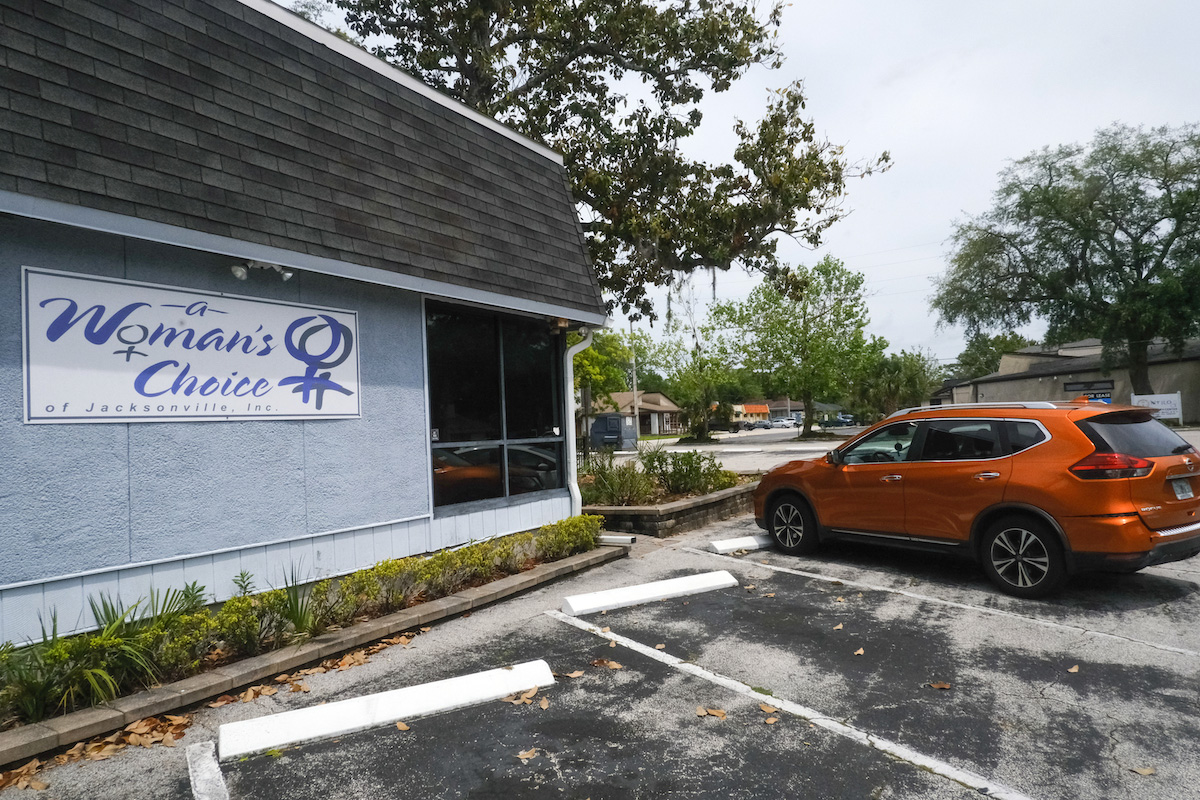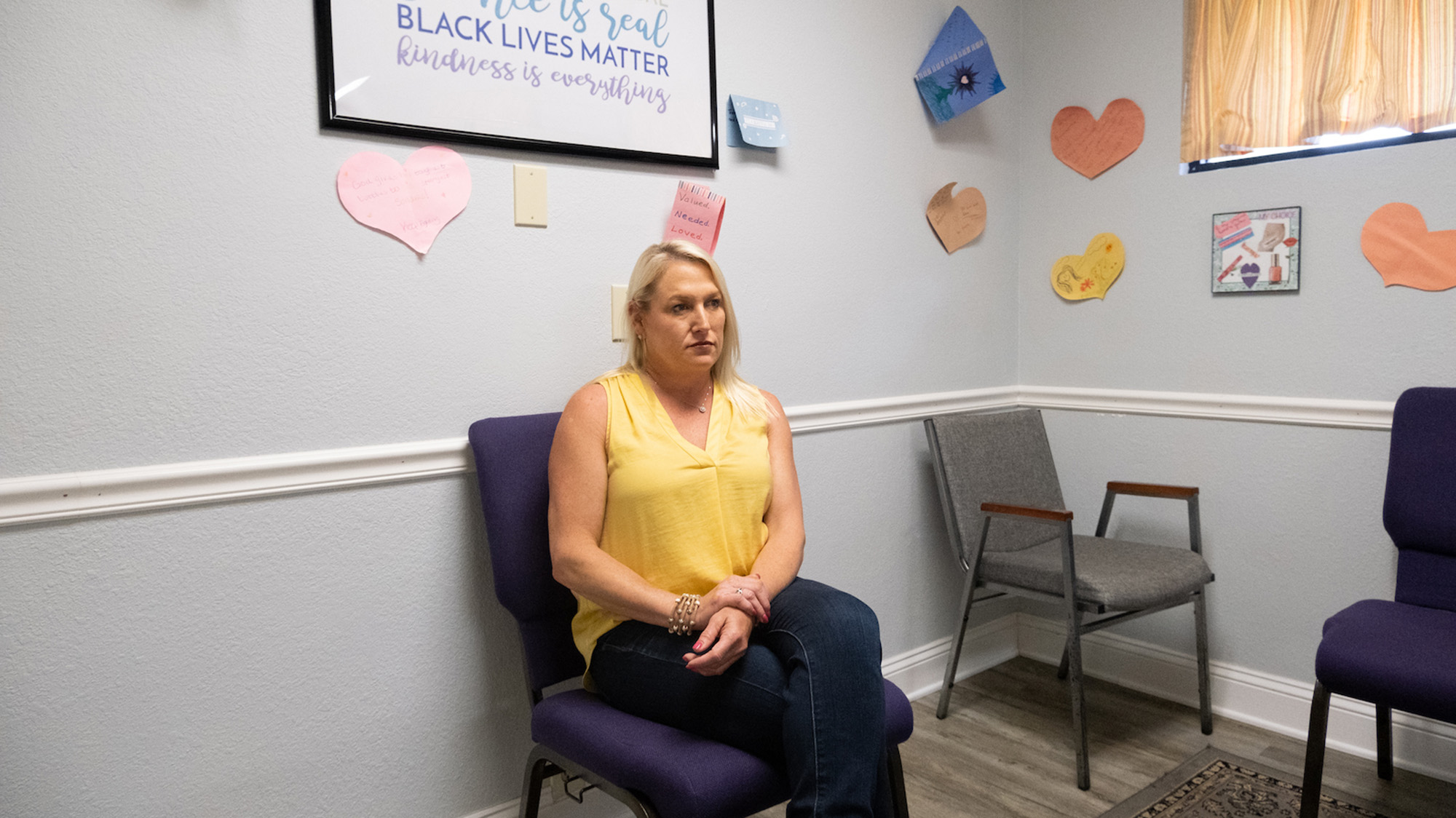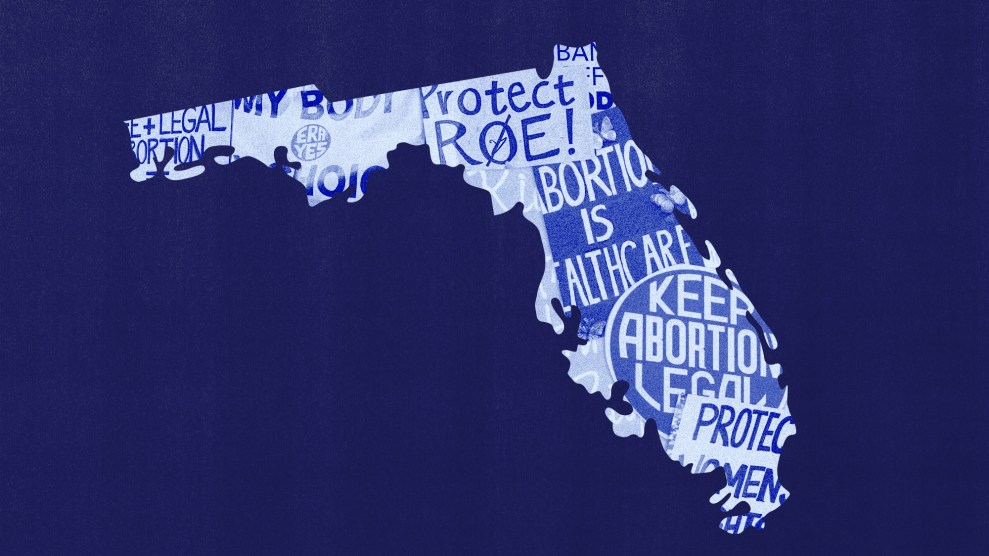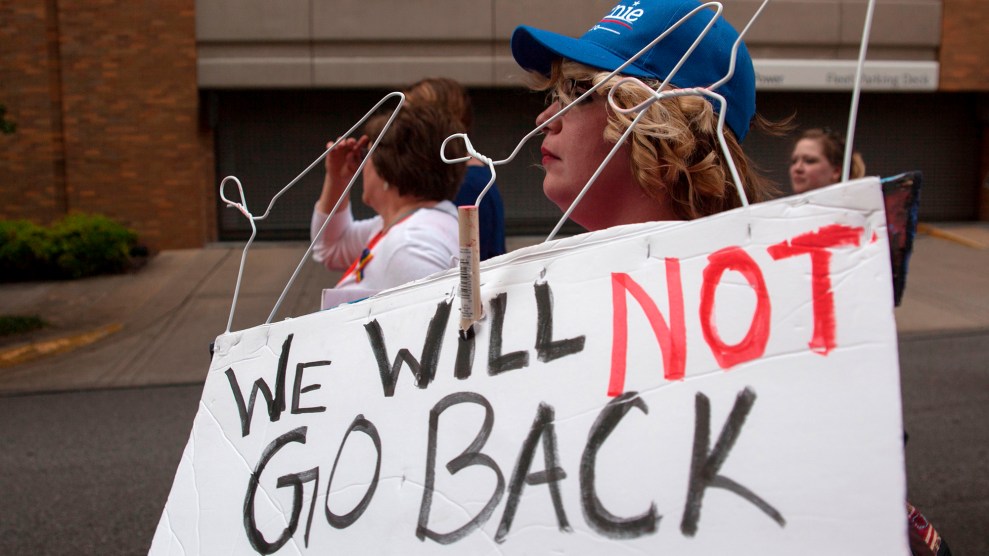This article is a collaboration between Mother Jones and Reveal from The Center for Investigative Reporting, which is a nonprofit investigative newsroom. Sign up to get their investigations emailed to you directly.
For more than a year, Kelly Flynn had to hire off-duty officers to provide security for her Florida abortion clinic, A Woman’s Choice of Jacksonville, after a local anti-abortion group moved into the vacant building next door and police calls related to harassment spiked.
Now, though, the Jacksonville Sheriff’s Office is assigning an on-duty officer to the clinic every day “to ensure the safety of all parties,” spokesperson John Medina said in a statement, and expects to continue “for the foreseeable future.” The officers’ regular presence, Flynn said, has been reassuring to patients and staff: “We are a safe place.”
The change in policy began soon after Reveal from The Center for Investigative Reporting spotlighted a surge in harassment, disturbances, and violence at clinics around Florida amid a lack of state and local protections for abortion providers and patients.
The Jacksonville move reflects a growing awareness among local, state, and federal authorities about the mounting risks that abortion providers and patients will face now that the US Supreme Court has overturned Roe v. Wade. The decision in Dobbs v. Jackson Women’s Health Organization is expected to trigger a new wave of clashes as abortion is certain or likely to be banned in 26 states and the remaining open clinics will offer anti-abortion protesters and extremists fewer and clearer targets.
The US Department of Homeland Security has been on alert for an increase in political violence following the Dobbs decision, according to a leaked memo. It was already happening even before the court’s ruling: On May 25, an arson was reported at a building set to become Wyoming’s only clinic providing surgical abortions. On New Year’s Eve, a fire destroyed a Planned Parenthood in Tennessee. A handful of crisis pregnancy centers—which are usually run by religiously aligned organizations and try to dissuade people from having abortions—also have been vandalized or set on fire across the country in recent weeks.
“We are about to face a sea change in this nation unlike anything we have ever seen, certainly when it comes to gender equality and reproductive health care,” said Andrea Miller, president of the National Institute for Reproductive Health, which advocates for legislation to protect abortion rights. “We would encourage states and localities to look at all of their options and to really be creative at this moment and also to really be proactive.”
Some lawmakers have been heeding the warnings. In New York, Gov. Kathy Hochul recently announced that the state will dedicate $10 million toward security for abortion care providers and an additional $25 million to expand abortion access. Maine legislators passed a law in April that creates 8-foot “medical safety zones” around clinic entrances.
One of the most sweeping laws targets the use of cellphones and cameras as tools of harassment. Signed by California Gov. Gavin Newsom last year, it prohibits taking photographs or videos of abortion patients and staff within 100 feet of a clinic if the intent is to intimidate, establishes law enforcement training on crimes targeting providers, and requires reporting of those crimes to the state.
“We are really focused right now on what will the future of abortion look like and how do we as California remain a beacon of equity and access for every woman who needs it?” the bill’s main author, Assemblymember Rebecca Bauer-Kahan, a Democrat from the San Francisco Bay Area, told Reveal. “And the security (of providers) is a huge piece of it.”

Woman’s Choice clinic in Jacksonville.
Malcolm Jackson/Reveal
Some cities are also taking action. The National Institute for Reproductive Health partnered with advocates in Louisville, Kentucky, to help pass legislation last year creating 10-foot safety zones for all health care facilities, including the city’s two abortion clinics. Those clinics have stopped providing abortion care now that Roe is gone, but the safety zone rule remains.
State and local efforts take on added importance because the sole federal law aimed at protecting abortion clinics from violence doesn’t cover the new types of harassment and intimidation that have been skyrocketing, Reveal’s reporting found.
The Freedom of Access to Clinic Entrances, or FACE, Act, enacted in 1994, empowers the Justice Department to bring criminal charges or civil lawsuits against people who commit acts of “force” or “threat of force” or “physical obstruction” against patients and providers entering clinics. But the FACE Act was carefully tailored to avoid criminalizing free speech; anti-abortion protesters also have adapted their tactics to stay within the law. As Reveal found, the federal government has brought only 101 FACE Act cases in 28 years, an average of four per year.
The FACE Act “isn’t viable as an option in many instances,” Rep. Lauren Underwood (D-Ill.) said in an interview. Yet by passing tough anti-abortion legislation that emboldens protesters, “states have made a policy choice to increase the vulnerability of health care providers,” she said. Underwood, a nurse by training, is a co-sponsor of a new bill that would establish a federal grant program to help providers strengthen the physical security and cybersecurity of their facilities. The legislation would apply to all health care providers – including, for example, those targeted for providing care to the LGBTQ community.
“Just as we protect the Supreme Court, we should protect health care providers, their patients, and the people who go in and out of those facilities,” said Democratic Rep. Veronica Escobar of Texas, the bill’s main author.
Abortion rights advocates applaud the grant approach, which leaves it to clinics to decide how best to safeguard their employees and patients.
“Abortion providers know what they need and what works for them,” said Heather Shumaker, director of state abortion access at the National Women’s Law Center. For instance, some might choose to rely on private security guards or volunteer escorts because patients of color “may not feel safe when law enforcement is showing up,” she said. “Every clinic is very unique,” she added.
In Florida, West Palm Beach is one of the few cities with any clinic protections. A noise ordinance, in place since 2011, bars shouting or amplified sounds within 100 feet of any health care facility, including abortion providers. But so far, the state’s Republican-dominated legislature has shown little interest in passing broader protections for the state’s 55 clinics. A Democratic bill to create a state law mirroring the federal FACE Act failed in 2018. The same thing happened last spring when Democrats tried to tuck protections for clinics into a GOP-sponsored ban on abortions after 15 weeks of pregnancy.
“That has been a constant theme for us in the Legislature, of trying to put into place more protections for clinics,” said state Rep. Anna Eskamani, a Democrat from Orlando who was senior director of public affairs and communications at a regional Planned Parenthood before taking office. “It’s not something that we’re dramatizing. It’s real that people who work as abortion providers are specifically targeted for the work that they do.”
But one new Republican-sponsored law could end up inadvertently helping providers. Inspired by high-profile protests outside the homes of Republican Florida Sens. Marco Rubio and Rick Scott, among others, the measure makes it a second-degree misdemeanor to picket outside someone’s home “with the intent to harass or disturb that person in his or her dwelling.”
In signing the bill in May, Gov. Ron DeSantis pointed to the protests following the leaked Supreme Court draft opinion that had spelled out the end of Roe. “Sending unruly mobs to private residences, like we have seen with the angry crowds in front of the homes of Supreme Court justices, is inappropriate,” he said in a statement.
The new law protects all Florida residents—including abortion clinic employees.
“The question is, will it be equally applied?” said Eskamani, who voted against the bill. “We just don’t know.”


















